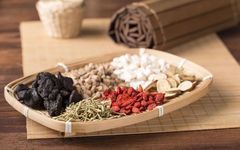01
As one reaches middle age, it is inevitable to add goji berries to the thermos. This phrase captures the helplessness and fatigue of many middle-aged individuals.
It is said that upon reaching middle age, life becomes a watershed; physiological maturity leads to increasing silence. The decline in bodily functions makes one feel increasingly powerless.
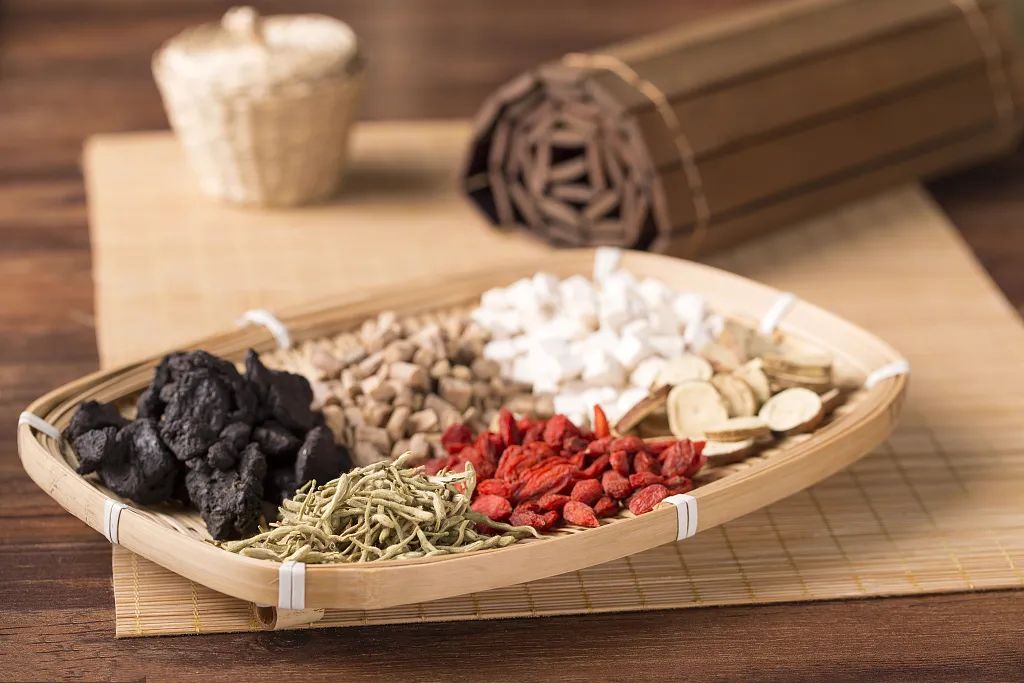
This formula is recommended from the Song Dynasty’s “Sheng Ji Zong Lu” known as “Ling Xian San”.
This formula is a miraculous remedy for those after middle age, capable of replenishing the essence of the five organs; it is a nourishing tonic for middle-aged individuals.
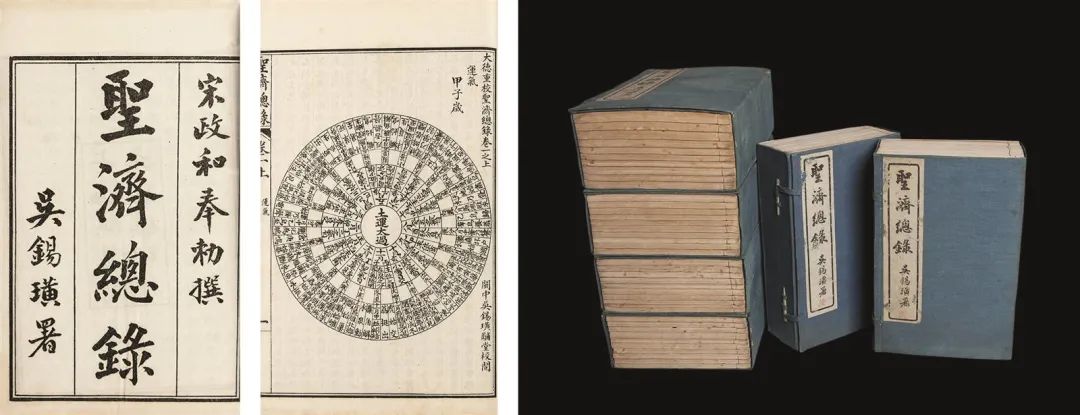
This formula nourishes the kidneys, supports the liver, replenishes the lungs, benefits the spleen, calms the heart, and invigorates the blood. It is effective for middle-aged and elderly individuals suffering from deficiency of the five organs’ essence, physical weakness, premature graying of hair, dental issues, dry intestines, and more…
The complete formula consists of Bai Fu Ling (White Poria) 1 liang, Jue Sheng Zi (Coriander Seed) 1 liang (peeled, cooked for 1 day), Tian Men Dong (Asparagus Tuber) 1 liang (heart removed, roasted), Bai Zhu (Atractylodes) 1 liang, Tao Ren (Peach Kernel) 1 liang (peeled and roasted), Huang Jing (Polygonatum) 1 liang, and other six herbs ground into powder, taken 2-3 times a day, 3-5 grams each time.
Why is this formula called Ling Xian San? The ancients had their reasons for using powders. Many people prefer pills, perhaps thinking they are more sophisticated. If you prefer pills, you can cook honey until it reaches a pearl-like consistency, then mix in the powdered herbs to form honey pills. The usual ratio is 10 (herbs) to 3 (honey).
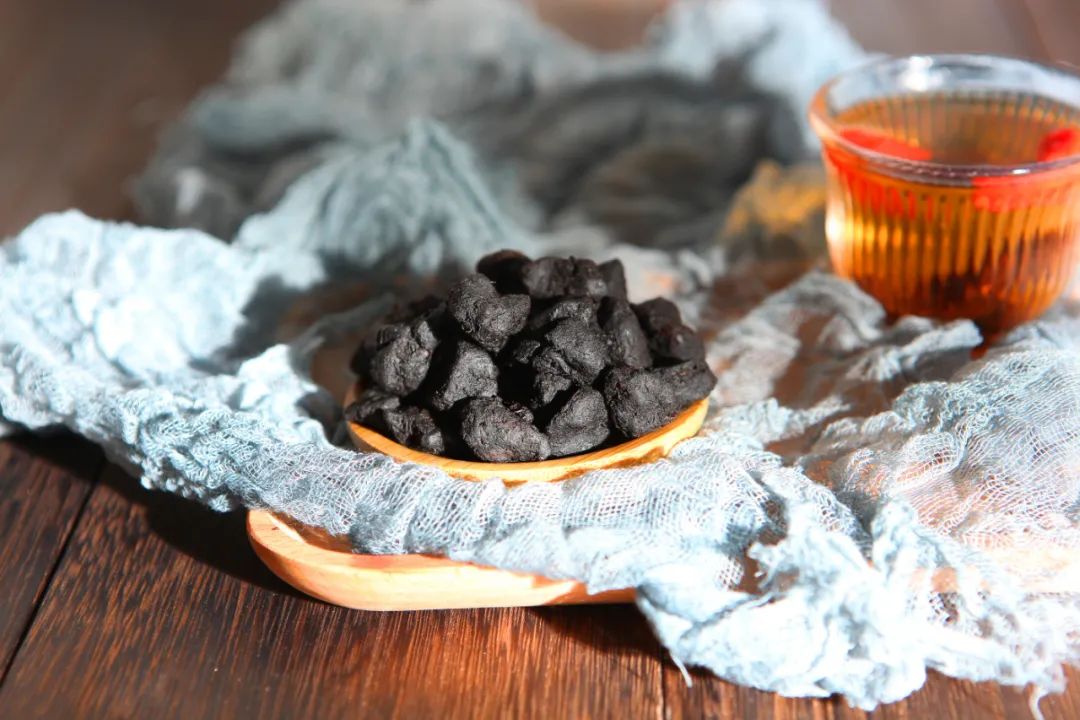
02
Next, let’s delve deeper into the effects of these herbs:
As the saying goes, all herbs have spirit, and everything has feelings; one might inadvertently cultivate (essence). Today, we will first introduce the herb “Huang Jing”.
Huang Jing has a sweet taste and a neutral nature, entering the spleen, lung, and kidney meridians. The ancients believed that Huang Jing belongs to the category of herbs that embody the essence of the earth, hence it is referred to in the “Wu Fu Jing” as “Wu Ji Zhi”. The famous physician of the Southern and Northern Dynasties, Tao Hongjing, also called it “the surplus food of immortals”.
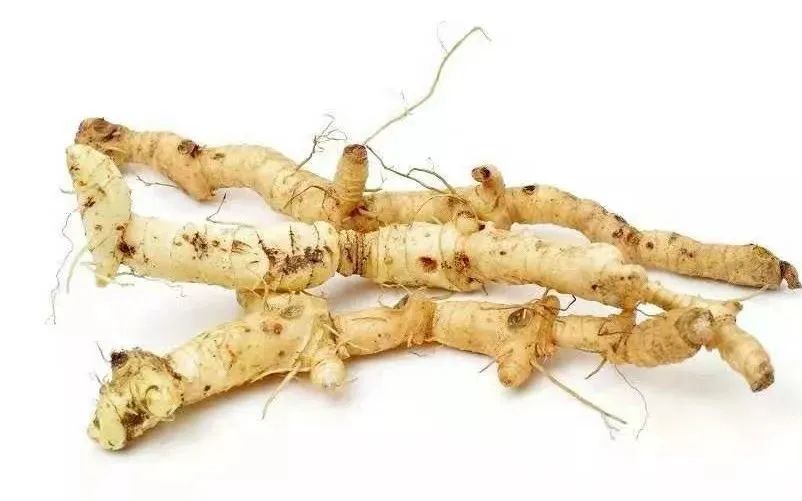
For men, frequent late nights, overtime work, and social engagements can damage the essence in the kidneys. Taking Huang Jing can replenish kidney qi, improve fatigue, and strengthen the waist and nourish the bone marrow.
According to the “Compendium of Materia Medica”, Huang Jing can replenish various deficiencies, generate essence and qi, prolong life with long-term consumption, and is considered a sacred food for men (meaning Huang Jing can replenish various parts or regulate the weakness of certain internal organs).
For women, it nourishes yin, moistens the lungs, benefits qi and blood, improves anemia, nourishes the skin, and eliminates wrinkles. Additionally, it has a good regulating effect on symptoms caused by kidney essence deficiency such as lower back and knee soreness, dizziness, tinnitus, fatigue, and premature graying of hair.
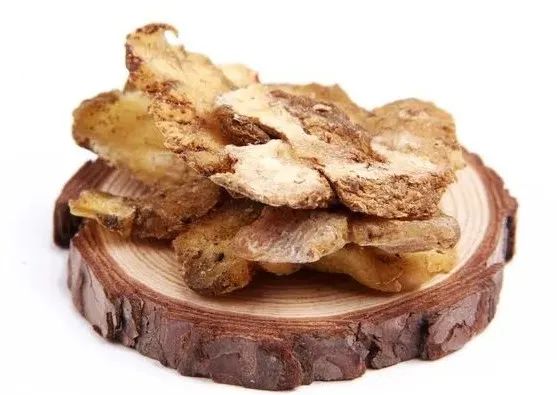
Huang Jing is a health supplement that nourishes both qi and yin, fills essence and marrow, moistens the lungs and generates fluids, and replenishes the deficiencies of the five organs. Its properties are mild, making it very suitable for regular consumption by middle-aged and elderly individuals, as they often have weak yang and insufficient yin fluids.
Speaking of Jue Sheng Zi, many may not be familiar with it. If we mention black sesame, everyone knows it. The “Medicine King” Sun Simiao recorded in the “Qian Jin Fang” that “only sesame is good in the world, but unfortunately, ordinary people eat it raw”.
This saying is widely circulated in Taoism, and sesame has long been listed as a top health food. Taoist health practices are considered to be at a high level in our country, but they are not easily shared.
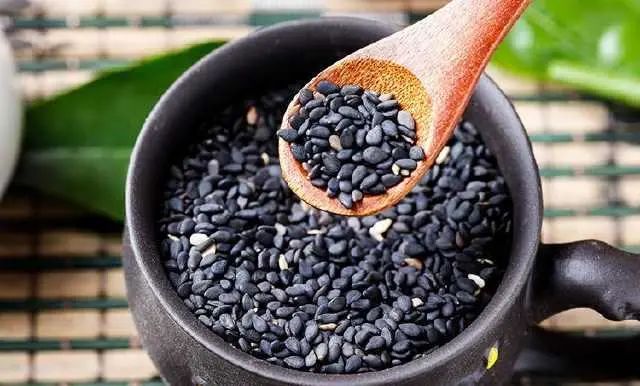
Traditional Chinese Medicine believes that the kidneys are the foundation of congenital essence. As a person grows, kidney essence gradually depletes, leading to symptoms such as lower back and knee pain, hair loss, weakness in the legs, irritability, insomnia with vivid dreams, and acne. If kidney qi declines, one reaches old age.
When the “surplus food of immortals” Huang Jing is combined with black sesame, which is known for “nourishing the kidneys and solidifying the foundation”, their combined effects in replenishing qi, darkening hair, and benefiting kidney essence become even more powerful!
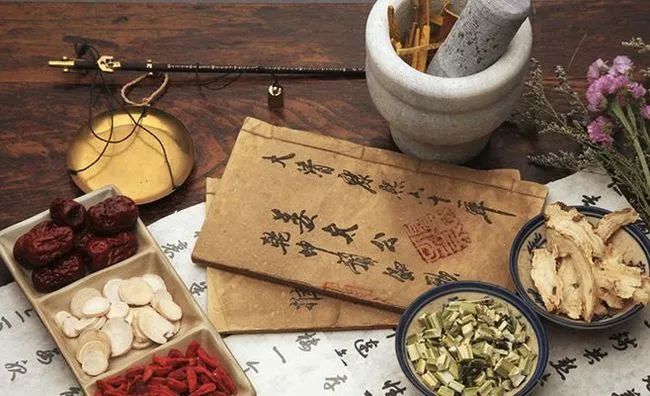
03
The next two herbs are Bai Zhu (Atractylodes) and Fu Ling (Poria).
Many tonics are rich and greasy; we have all heard the saying “deficiency cannot withstand tonics”, meaning that if the body is weak, it cannot bear the power of tonics.
When the body is weak, qi and blood cannot circulate normally, and with spleen and stomach deficiency, digestion and absorption are poor, leading to improper movement of nutrients. After supplementation, symptoms such as abdominal pain, bloating, diarrhea, and even heat can occur…
At this time, Bai Zhu can strengthen the spleen, enhance its function, and prevent tonics from being overly rich and greasy, causing the body to be unable to withstand them.
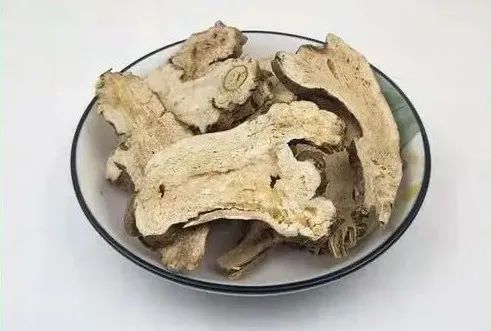
Bai Zhu is warm in nature, with a bitter and sweet taste, and is a key herb for strengthening the spleen. The spleen belongs to the earth element in the five elements, located in the middle jiao of the human body, and earth can generate all things. “The spleen is the foundation of postnatal life and the source of qi and blood transformation”. After birth, all life activities rely on the nutrients absorbed by the spleen and stomach. Those with congenital deficiencies can replenish through postnatal nourishment, which can also prolong life.
Many talented individuals in the past ended their lives prematurely, which we now call “heavenly jealousy of talent”. If they had learned some TCM in their early years, such situations could have been avoided.
Bai Zhu not only strengthens the spleen but also dries dampness and promotes water metabolism, helping to transform the fluids in the middle jiao.
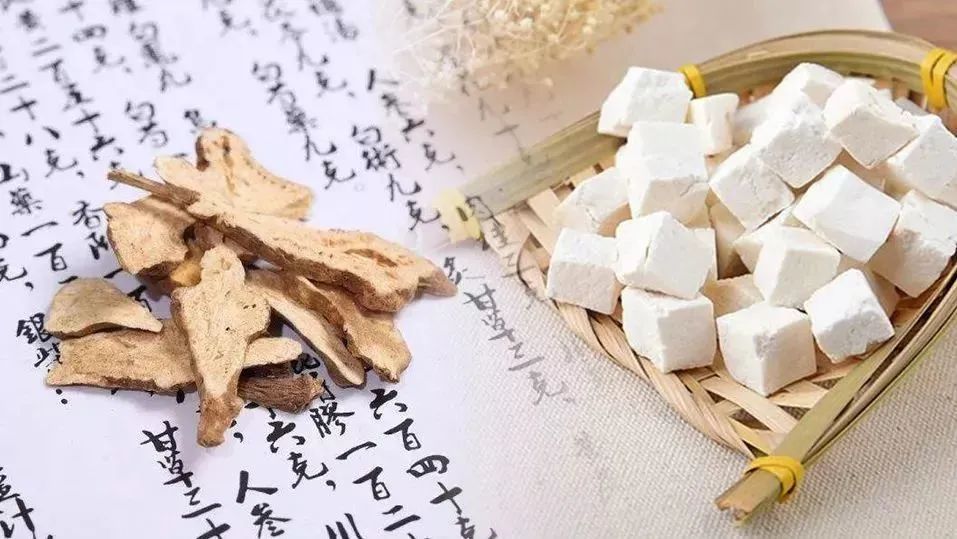
Li Shizhen’s “Compendium of Materia Medica” and other TCM records state that Bai Zhu has the effect of removing spots, and it is described as “extreme”. The ancient text “On the Properties of Herbs” also states: “It primarily brightens the complexion and removes spots.”
TCM states that the spleen governs the muscles; a person’s muscle firmness is related to the spleen. All symptoms of sagging muscles, drooping eyelids, facial muscle relaxation, sagging breasts, stomach drooping, abdominal fat sagging, and uterine prolapse are due to the spleen not governing the muscles.
Bai Zhu and Fu Ling are also known as gentleman’s herbs, frequently appearing in formulas for strengthening the spleen and eliminating dampness.
Fu Ling has a sweet, bland, and neutral nature, entering the heart, lung, and spleen meridians. It has the effects of promoting diuresis, strengthening the spleen and stomach, eliminating dampness and phlegm, and calming the mind.
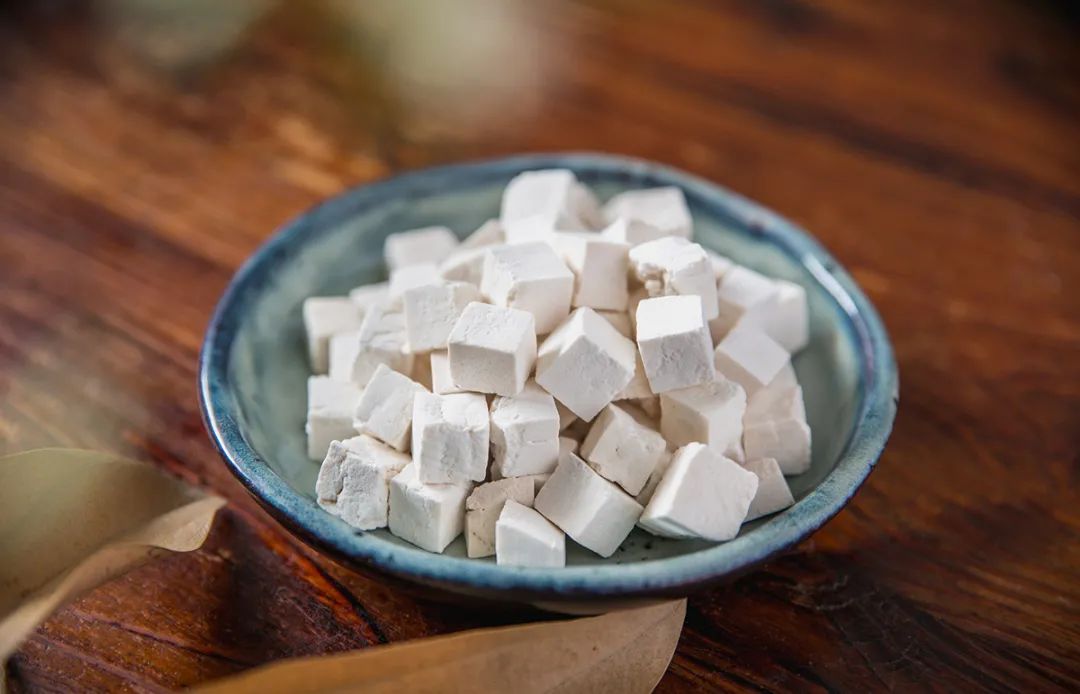
Fu Ling has almost no taste; in TCM, it is called bland. Bland flavor has a special ability to promote diuresis and invigorate the spleen and stomach’s ability to transform water and dampness, clearing excess water and fat from the body, and can help reduce weight.
For those who have oily hair and excessive dampness after washing their hair, Fu Ling can guide the dampness from the hair roots downwards, thus treating seborrheic alopecia. The famous physician Yue Meizhong’s Fu Ling drink for hair loss has been widely circulated.
Tian Men Dong (Asparagus Tuber) has a sweet and bitter taste and a cold nature, entering the lung and kidney meridians. It excels at nourishing kidney yin and has the ability to clear heat and drain fire.
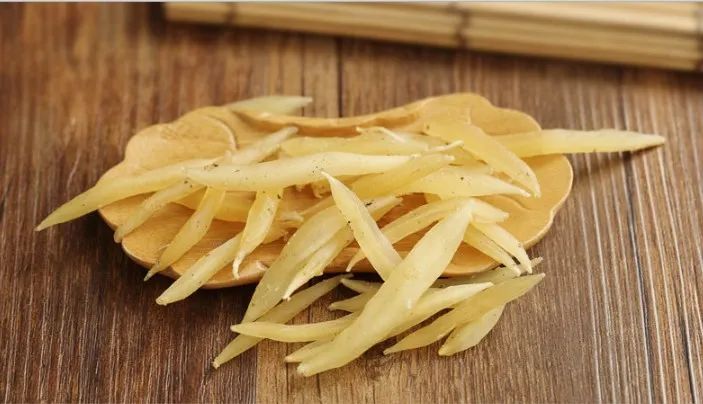
Tian Men Dong is thick and fatty, moistening and cooling, clearing metal and transforming water, nourishing kidney yin through the lung (metal) and irrigating downwards, nourishing the muscles.
Since the lungs govern the skin and many pores are enlarged, hair tends to be oily, and skin easily becomes red, those who sweat easily are often due to the leakage of original qi from the kidneys.
If the lung water is sufficient, the moisture in the skin will gradually become abundant, so Tian Men Dong can also whiten the skin and reduce spots, and long-term consumption can lead to a radiant complexion.
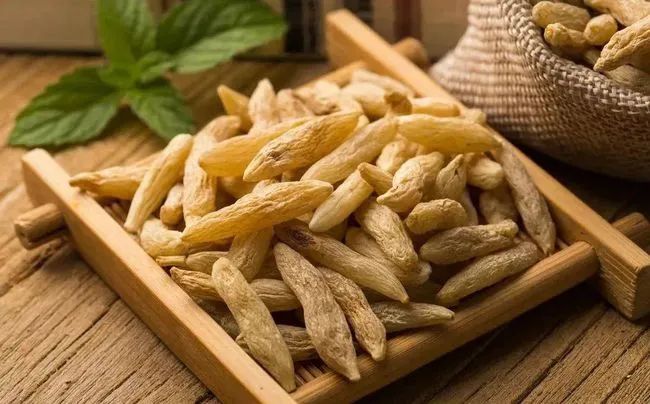
04
The last herb is Tao Ren (Peach Kernel).
Tao Ren, the seed of the peach, has a bitter and sweet taste, neutral nature, and enters the heart, liver, and large intestine meridians. It can invigorate blood, dispel stasis, moisten the intestines, and relieve cough and asthma.
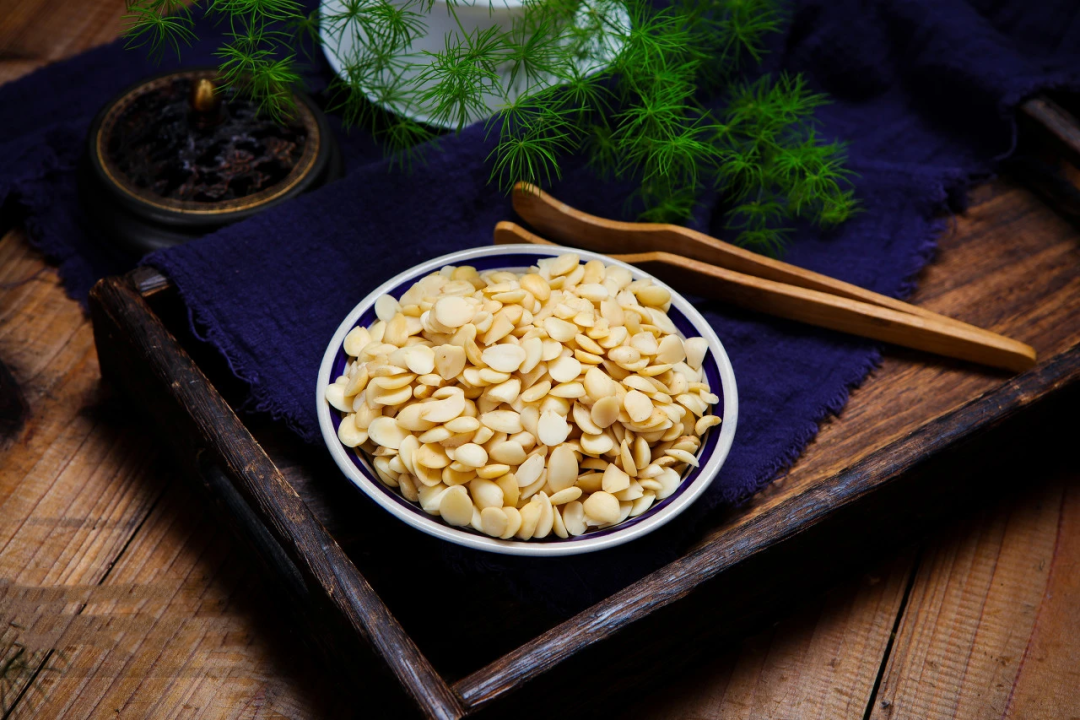
All medicinal fruit kernels have oiliness; Tao Ren can promote bowel movements. For elderly individuals with dry stools and insufficient body fluids, it is like a machine that rusts without oil; adding some oil will get it running again.
Tao Ren can also moisturize the skin, alleviating dryness and itching, especially at night when many elderly individuals experience increased itching due to warmth from blankets. Symptoms resemble snake skin, with pants and socks appearing like snowflakes.
According to the “Record of Famous Physicians”, it can “break masses and unblock menstrual flow”; Li Dongyuan referred to it as “moving the blood stagnation in the skin”. The “Compendium of Materia Medica” states it “dominates blood stasis”, indicating that Tao Ren has a strong effect on invigorating blood and dispelling stasis.
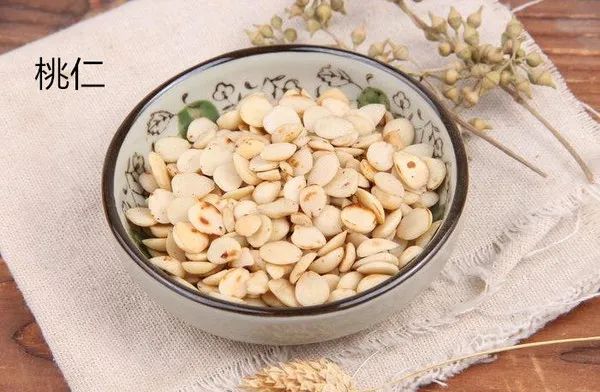
Tao Ren can break blood stasis with great strength, clearing useless blood clots and unblocking stagnation, allowing new blood to be reborn. It can also dispel spots and wrinkles, making it a superior beauty herb.
The entire formula consists of six ordinary herbs, but there are a few points to note:
The first point is, there is a saying that goes very well, good herbs lead to good medicine; try to choose organic and proper herbs.
The second point is, those who understand the preparation of Chinese herbs should try to use traditional methods for natural preparation. Although using traditional methods may be time-consuming and labor-intensive, it can make the entire formula more balanced, achieving nourishment without stagnation and richness without greasiness.
Source: Internet, for learning and exchange purposes only

